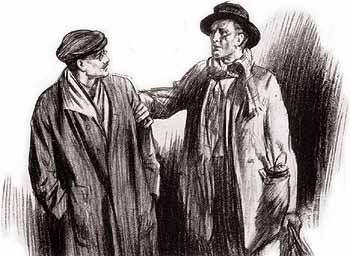A few minutes later the train ran into the ill-lit station, and there was a general clearing; for Vermissa was by far the largest town on the line. McMurdo picked up his leather gripsack and was about to start off into the darkness, when one of the miners accosted him.
“By Gar, mate! you know how to speak to the cops,” he said in a voice of awe. “It was grand to hear you. Let me carry your grip and show you the road. I’m passing Shafter’s on the way to my own shack.”
There was a chorus of friendly “Good-nights” from the other miners as they passed from the platform. Before ever he had set foot in it, McMurdo the turbulent had become a character in Vermissa.
The country had been a place of terror; but the town was in its way even more depressing. Down that long valley there was at least a certain gloomy grandeur in the huge fires and the clouds of drifting smoke, while the strength and industry of man found fitting monuments in the hills which he had spilled by the side of his monstrous excavations. But the town showed a dead level of mean ugliness and squalor. The broad street was churned up by the traffic into a horrible rutted paste of muddy snow. The sidewalks were narrow and uneven. The numerous gas-lamps served only to show more clearly a long line of wooden houses, each with its veranda facing the street, unkempt and dirty.
As they approached the centre of the town the scene was brightened by a row of well-lit stores, and even more by a cluster of saloons and gaming houses, in which the miners spent their hard-earned but generous wages.
“That’s the Union House,” said the guide, pointing to one saloon which rose almost to the dignity of being a hotel. “Jack McGinty is the boss there.”
“What sort of a man is he?” McMurdo asked.
“What! have you never heard of the boss?”
“How could I have heard of him when you know that I am a stranger in these parts?”
“Well, I thought his name was known clear across the country. It’s been in the papers often enough.”
“What for?”
“Well,” the miner lowered his voice – “over the affairs.”
“What affairs?”
“Good Lord, mister! you are queer, if I must say it without offense. There’s only one set of affairs that you’ll hear of in these parts, and that’s the affairs of the Scowrers.”
“Why, I seem to have read of the Scowrers in Chicago. A gang of murderers, are they not?”

“Hush, on your life!” cried the miner, standing still in alarm, and gazing in amazement at his companion. “Man, you won’t live long in these parts if you speak in the open street like that. Many a man has had the life beaten out of him for less.”
“Well, I know nothing about them. It’s only what I have read.”
“And I’m not saying that you have not read the truth.” The man looked nervously round him as he spoke, peering into the shadows as if he feared to see some lurking danger. “If killing is murder, then God knows there is murder and to spare. But don’t you dare to breathe the name of Jack McGinty in connection with it, stranger; for every whisper goes back to him, and he is not one that is likely to let it pass. Now, that’s the house you’re after, that one standing back from the street. You’ll find old Jacob Shafter that runs it as honest a man as lives in this township.”
“I thank you,” said McMurdo, and shaking hands with his new acquaintance he plodded, gripsack in hand, up the path which led to the dwelling house, at the door of which he gave a resounding knock.